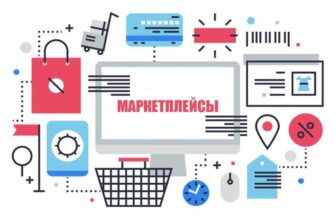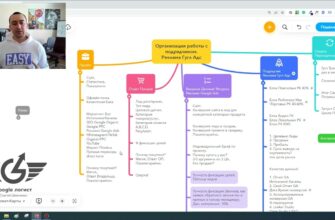- What is considered unacceptable content for advertising on Google Adwords?
- Prohibited topics in Google Ads
- Life-threatening goods and services
- Counterfeits
- Questionable and shocking content
- Fraudulent activity
- Fundraising
- Free products
- Event ticket sales
- Black marketing
- Unofficial service centers
- Misleading
- What content cannot be advertised on Google Ads without additional permissions?
- Alcohol
- Erotic content
- Copyright
- Healthcare and medicines
- Advertising of medical services in the EU
- Gambling
- Financial transactions
- Policy
- Which advertisers are blocked in Google Ads?
Google Ads is one of the most popular and effective online advertising platforms in the world. It provides businesses with excellent opportunities to promote themselves, attract new customers, and increase sales. However, in order to ensure high-quality advertising and protect the interests of internet users, Google has established restrictive rules regarding acceptable content.
Before launching a campaign on the Google Ads platform, you will need to carefully review its policies and ensure that your content, both for advertising and on your website, fully complies with all requirements. Failure to comply with these conditions will result in serious consequences, ranging from refusal to place ads to complete blocking of your advertising account.
Today, we will take a detailed look at prohibited topics in Google Ads and provide useful recommendations to help you successfully pass moderation and avoid potential problems.
How many calls and sales will I get by ordering contextual advertising from you?
I need to calculate the conversion of my website Describe
the task
in the application
Calculate potential ad revenue Google
contextual advertising calculator
What is considered unacceptable content for advertising on Google Adwords?

Google divides all advertising content into three categories:
- Fully permitted. Goods whose promotion is not subject to any restrictions.
- Restricted. Products that can be advertised, but certain conditions must be met depending on the region.
- Completely prohibited. This includes content that cannot be advertised on Google Ads under any circumstances.
Restrictions usually depend directly on the laws of specific countries and regions. Google Ads strives to pay maximum attention to local legal regulations, so marketing opportunities may vary depending on your target audience.
Important! Google Ads’ policy on acceptable content is constantly being updated, so be sure to regularly review the latest summary in the Help Center. If you have any doubts about your campaign, it is better to err on the side of caution and consult with customer support beforehand.
Prohibited topics in Google Ads

Let’s take a look at the main groups of goods and services that Google prohibits from advertising. By knowing these conditions, you will be able to choose the perfect theme for your advertising messages and ensure that they pass the review process successfully.
Life-threatening goods and services
First and foremost, restrictions are imposed on items that could harm human health or life. This category includes a wide range of products. If your business is involved in the manufacture or sale of potentially dangerous items, be prepared to be banned by Google. It does not matter whether your activity is permitted by the laws of a particular country.
For example, in Ukraine, it is legal to sell weapons, but advertising them is not. At the same time, in some US states, such as Texas and Florida, advertising weapons is permitted.
Self-defense products deserve a separate mention. Even if we are talking about legal and relatively safe products, such as pepper spray or stun guns, their advertising will still be rejected by Google moderators.
In addition to weapons, explosives, pyrotechnics, and instructions for making explosives and ammunition are also prohibited. It is also prohibited to promote drugs (including recreational drugs), devices for their use, and any products related to smoking, such as electronic cigarettes, vapes, hookahs, etc.
Counterfeits
Google takes the issue of counterfeit goods seriously and takes measures to protect ordinary consumers from fakes. Advertising items that imitate well-known brands or mislead consumers is strictly prohibited.
Regardless of the type of product being promoted, to successfully pass moderation, avoid using words such as “fake,” “replica,” “imitation,” and similar phrases in product descriptions. If such advertising is somehow overlooked, it will be a violation of the rules, which could have serious consequences for your account.
Questionable and shocking content

Content that may cause negative emotions or shock people is prohibited. This includes profanity, shocking photos and videos, as well as any material promoting discrimination, violence, hatred, and other similar topics.
Do not attempt to promote your business by evoking negative emotions in your audience. Google and its related services are capable of recognizing such content. Even if a questionable message initially passes moderation, it will eventually be rejected, especially if complaints are received. This also includes content that incites hatred or discriminates against any social groups.
And, of course, ads that lead to pages with a large number of annoying elements that distract from the main content may be blocked. We are talking about pop-up windows, sudden animations in GIFs and videos, as well as unnecessary background music.
Fraudulent activity
Advertising of hacking software and instructions for its use is not allowed. Systems for unfairly improving digital metrics, such as inflating traffic, clicks, views, and likes, are also prohibited.
Google opposes companies that promote fake documents, even in the field of education. Writing diplomas and other works for students is formally prohibited from being advertised on Google, although in practice some such ads slip through to the search results.
Even the landing page is taken into account here. It should not mislead visitors, force them to behave in a way that is beneficial to the advertiser, or store their personal data without providing clear information about the advertised offer.
Advertisements cannot contain links to malicious software. At the same time, the actual address of the page cannot be masked. If the address leads to the download of files or pages with an excessive amount of advertising to the detriment of useful content, the advertisement will inevitably be rejected.
This also includes web resources that charge fees for products that consumers should receive free of charge. These may include university applications, government documents, and much more.
Also, be careful when working with psychics, fortune tellers, and magicians. In Ukraine, such activities are considered fraudulent, although in the US and some other countries, their promotion is permitted.
Fundraising
Non-profit organizations that are not exempt from taxes are not allowed to collect monetary donations through advertising in this system. Therefore, if your non-profit company does not have tax exemptions, you will not be able to launch a campaign to attract donations.
However, if your organization is tax-exempt and can prove its status, you can raise funds provided that you comply with all other requirements of the platform.
Free products
This refers to advertisements for free software for computers and laptops. As a general rule, such advertisements are not allowed to be displayed. However, there is an exception: if instead of a direct link to download the file, the landing page contains a link to the official distributor’s website, the advertisement may be approved.
Event ticket sales
There are also strict requirements for selling tickets to events. If your company does not have a special Google certificate, you will not be able to promote your resource.
Obtaining certification is a fairly complex and time-consuming process. Google carefully checks each applicant to guarantee users safety and reliability when purchasing tickets online.
Black marketing
It cannot be called completely fraudulent, but it has similarities. The essence lies in attempts to circumvent platform restrictions using various methods. For example, “black” marketing can be defined as concealing or distorting information about a company and its products. All data specified on the advertiser’s website must fully match the information in the account.
It is also prohibited to impersonate another person or organization, or to conceal information about your country of origin. You may not place political advertisements in a country with which you have no real connection.
The simplest “black hat” practice that Google is fighting against is displaying identical or very similar advertising messages to the same audience from multiple accounts.
Unofficial service centers

Since 2017, Google has been participating in a program to protect the rights of official equipment manufacturers. Although there is very little public information about this initiative, its essence boils down to limiting advertising opportunities for unofficial service centers and the secondary electronics market.
Since it is practically impossible to combat the resale of used equipment, the main pressure is on independent service centers. Google Ads may reject or block advertisements from such companies, making it more difficult for them to attract customers.
Misleading
To avoid moderation issues, it is important to provide complete and accurate information about your business. First and foremost, make sure that your website has all the necessary sections:
- The “Contacts” page with up-to-date contact information;
- The section on payment and delivery, which describes in detail all available payment methods and delivery terms;
- Information about warranties and return policies;
- A privacy policy explaining how you process customers’ personal data;
- All necessary documents — licenses, certificates, permits (if your activity requires licensing);
- Correct details of the individual entrepreneur or legal entity.
In addition, Google takes a negative view of advertisements promising instant results—such as rapid weight loss, instant wealth, or a dramatic improvement in your life in just a couple of days. Such claims will be regarded by the system as deliberately misleading the audience.
Be honest with your audience. This will not only help you avoid penalties from Google Ads, but also increase customer loyalty to your brand. After all, trust is a key factor in building long-term relationships with customers.
How many calls and sales will I get by ordering contextual advertising from you?
I need to calculate the conversion of my website Describe
the task
in the application
Calculate potential ad revenue Google
contextual advertising calculator
What content cannot be advertised on Google Ads without additional permissions?
Although Google Ads strives to provide the widest possible marketing opportunities, some types of content require a special approach and additional permissions. These are completely harmless but specific things, the promotion of which may be regulated by the laws of a particular country or local cultural characteristics.
Alcohol

Google allows the promotion of alcoholic beverages in Ukraine in both media and product advertisements. However, it is important to take into account a number of features and requirements for advertising content.
First and foremost, alcohol should not be positioned as a product for stimulation or relaxation, its benefits should not be exaggerated, and no unjustified claims should be made about its properties. For example, phrases such as “Our wine will help you relax after a hard day” or “Vodka X will make your party unforgettable” are unacceptable.
Remember the mandatory warning about the dangers of excessive alcohol consumption. It must occupy at least 15% of the image used in the advertisement, be written in black font on a white background, and be clearly legible. At the same time, the advertisement itself must be “hidden” from minors — when setting up your campaign, be sure to exclude them from your target audience by age.
If you plan to promote alcohol abroad, make sure that your chosen countries allow it and study the local nuances. For example, in France, you can simply talk about alcohol brands, but without referring to online sales.
Both in the ads themselves and on landing pages, it is unacceptable to show alcohol consumption while driving, in extreme conditions, or in the form of drinking contests. Any visual or textual references to alcohol abuse will result in immediate blocking.
Erotic content
Although the policy regarding erotic content is quite strict here, some adult products can still be promoted on the search network and Google Shopping. However, there are a number of restrictions.
Advertising for dating services and adult stores is permitted, provided that the landing pages do not contain explicit photographs of sexual activity or uncensored nudity.
The display of erotic advertisements depends on the age of the target audience, local laws, and search queries. For example, sex shop products can only be promoted using exact match keywords, such as “buy a vibrator.”
In turn, displaying such content for irrelevant queries is a direct request to Google to block your account. For example, promoting adult products using the phrase “sexologist courses” is unacceptable and will be considered a violation. The only complete ban, regardless of country, in the “adult” category applies to prostitution and online platforms such as OnlyFans.
Copyright
It is unacceptable to promote anything without the appropriate license from the copyright holder. It is also prohibited to use other people’s names, logos, texts, images, and other copyrighted materials.
Unfortunately, not all advertisers realize the serious consequences of intellectual property infringement. And although Ukraine has a law on copyright and related rights, there are those who, either out of ignorance or deliberately, use someone else’s content in their campaigns.
Healthcare and medicines
Advertising medical products also requires careful preparation. First of all, it is important to understand that only manufacturers with a special certificate from Google are allowed to promote medicines. In turn, advertising through online pharmacies, although it seems like a convenient solution, is prohibited in Ukraine.
The system strictly monitors advertisements to ensure that prohibited substances are not mentioned. Therefore, some clinics, such as those offering aesthetic medicine, may be blocked, especially if their websites mention drugs such as Botox or Dysport.
In addition, contraception, abortion, doping, and alternative medicine are not permitted in our country. Restrictions apply, among other things, to drugs and health improvement methods that have not been approved by the Ministry of Health.
General rules prohibit the promotion of non-prescription and unauthorized drugs, dietary supplements, weight loss products, and preparations containing certain substances (e.g., ephedrine or anabolic steroids). Medicines with names similar to those of prohibited substances are also banned.
To successfully promote approved pharmaceutical products, you need to provide as much information about them as possible:
- Complete product summary;
- Recommendation to carefully read the instructions;
- Reminder to consult a specialist;
- Warning about the dangers of self-medication (15% of the advertisement area, as in the case of alcohol).
As for cannabis advertising, it is only permitted in certain US states. However, promoting doctor consultations for prescriptions is allowed almost everywhere. Nevertheless, manufacturers often indicate that they do not deliver to certain states.
Advertising of medical services in the EU
In addition to the countries themselves, Google certifications and regulations, two important regulations influence the promotion of medical services in the European Union:
AVMSD
The Audiovisual Media Services Directive is a European Union directive that regulates audiovisual services in Europe, including television broadcasts, video, audio, and other audiovisual media content. The AVMSD exists to protect consumer rights and ensure that advertising complies with EU legislation.
The directive sets limits on the amount and types of marketing materials that can be shown on audiovisual platforms. For example, the AVMSD can restrict the promotion of medical services during certain hours. In addition, the directive requires compliance with ethical standards—calls for hatred or discrimination based on race, gender, religion, or nationality will be grounds for blocking.
GDPR
The General Data Protection Regulation is an important part of the European Union, in effect since 2018. The purpose of this document is to give EU citizens control over their personal data, ensure its protection, and standardize the collection, processing, and transfer of such information.
The GDPR applies to all organizations that collect and process data from EU citizens, regardless of their location. This means that if you plan to run healthcare campaigns targeting a European audience, you will need to comply with the requirements of the Regulation.
According to the GDPR, when collecting personal information, including health information, you must obtain the user’s explicit consent to process this data for advertising purposes. In addition, it is important to ensure that all collected information is reliably protected from unauthorized access or leakage.
Gambling

Ukraine has a ban on gambling and everything related to it. It is also prohibited to distribute promotional codes for gambling resources and any platforms where there are games for real money or references to them.
However, it is important to understand that in some countries, advertising casinos and other gambling entertainment is permitted. Therefore, if you plan to launch a marketing campaign for a foreign audience, first make sure that it does not violate the legal norms of the chosen country.
Financial transactions
This includes offers related to cash management, investments, and similar services. Financial advisors, banks, and non-bank institutions must strictly comply with the rules on the platform. The same applies to companies involved in cryptocurrency and investments.
Although advertising financial products is generally permitted in the US, you must provide Google with all licenses and permits confirming your right to provide the relevant services. Without these documents, it will be impossible to promote financial offers.
Policy
Political advertising must fully comply with the country’s election laws. It is very important to closely monitor the periods established by the state when political advertising is prohibited. During this time, the display of advertising messages in the political sphere will have to be suspended. This is mandatory for all advertisers, without exception.
To identify attempts to profit from such high-profile events, Google uses a combination of automated and manual checks. That is why ads with headlines about war in our country or calls to action that attempt to induce guilt over various disasters will be blocked by the system.
Which advertisers are blocked in Google Ads?

In addition to carefully monitoring content that cannot be advertised on Google Ads, the system also pays attention to your reputation. If you have not yet gained the trust of your audience and the system, or if you have lost it, your impressions will be limited. This is done to prevent negative experiences with advertisements and to increase trust in Google as an advertising platform.
In order for your ads to be displayed without restrictions, it is important to earn Google’s “approval.” This is assigned based on the following factors:
- Account attributes and age;
- User actions and their reports;
- Marketing formats used;
- History of compliance and violations;
- Features of your industry;
- Verified identity.
By earning the trust of the system, you will find it easier to obtain permission to display ads even in restricted categories. Therefore, from the very first days of your work, strictly comply with all service requirements in order to build an impeccable reputation.
However, even conscientious advertisers sometimes get blocked. This usually happens when multiple rules are violated at once or when attempts are made to promote unacceptable content in Google Adwords advertising.
If you are convinced that your commercial offer fully complies with the requirements, but your ads are not being displayed, please submit a request for review. If the blockage persists, you can request a refund by contacting support by phone.
Sometimes it is difficult to determine whether an ad will pass moderation, as the Terms of Use change regularly and are not always very specific. For new products, we recommend using a separate account. This will help avoid risks to your main account with a good history and active campaigns.


















